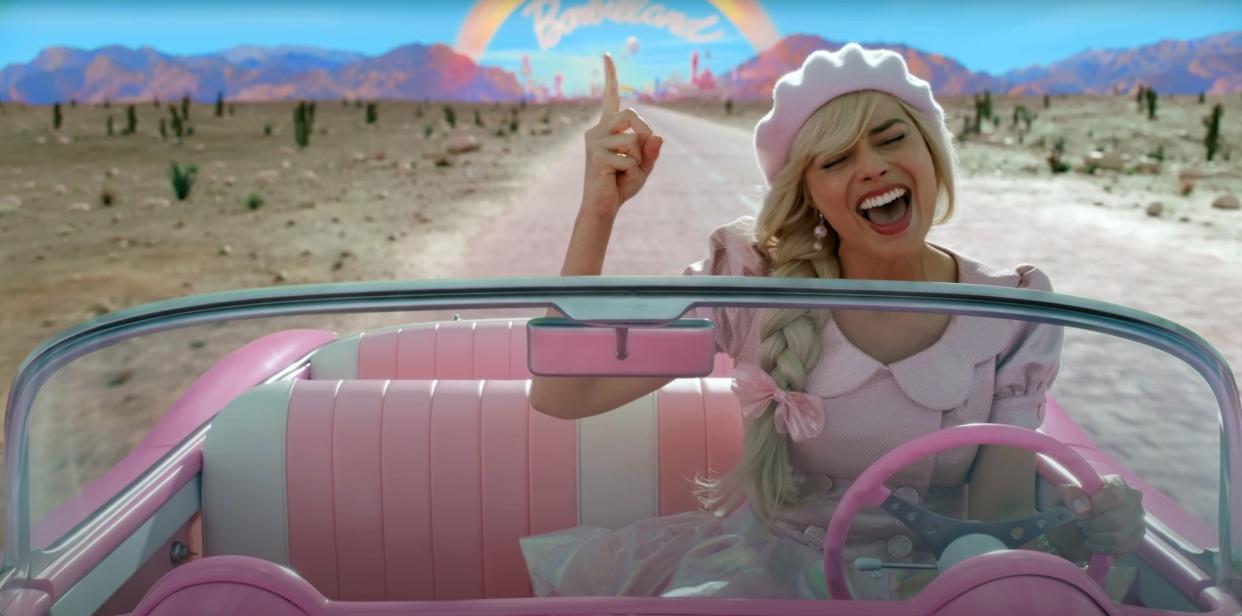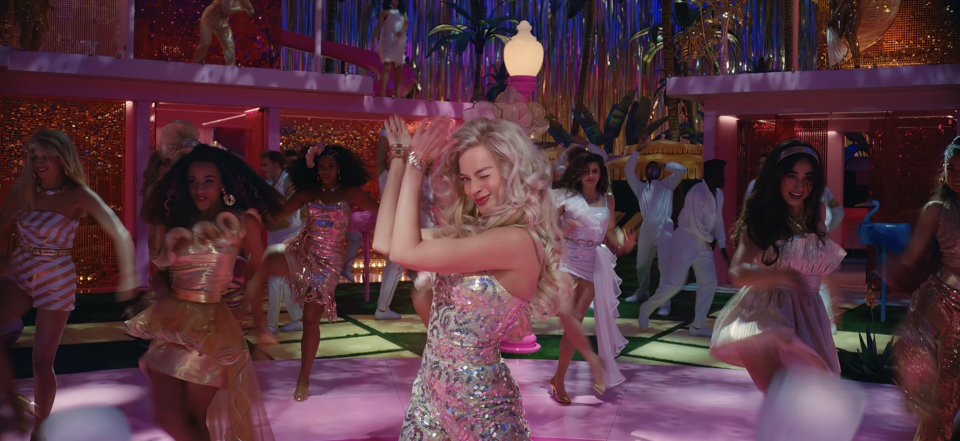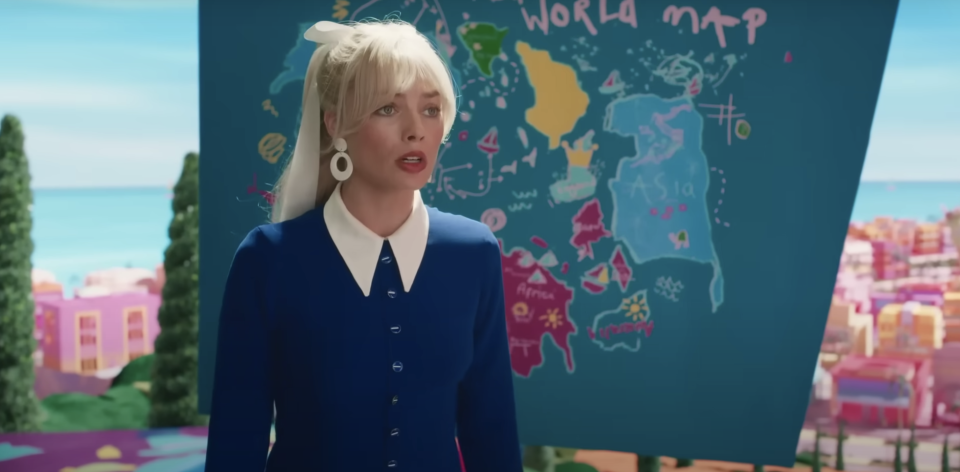Lizzo’s Song ‘Pink’ Immediately Brought the Opening Scene of ‘Barbie’ Into Focus

- Oops!Something went wrong.Please try again later.
- Oops!Something went wrong.Please try again later.
- Oops!Something went wrong.Please try again later.
Its all-female Supreme Court buys a lot of goodwill, but even so, it’s a tricky ask to get audiences to be comfortable with the relentless playfulness, artificiality, and earnestness of “Barbie.” The film’s tone isn’t quite everything (though it encompasses a lot), Greta Gerwig’s take on Mattel’s IP contains everything from a beach battle ballet to several quests for self-actualization to the ultimate trans-dimensional travel montage.
But as Gerwig and editor Nick Houy were constructing the footage and finding a way to settle the audience in the bonkers world of Barbie Land, they found a guiding hand: music.
More from IndieWire
Tom Cruise Wanted Sound He Could Feel in 'Mission: Impossible - Dead Reckoning'
What's Fi-Core? The Alternative to Being a Card-Carrying SAG-AFTRA Member
It only makes sense that, given Barbie Land exists adjacent to the real world, it would have its own bespoke music playlist. Of course Barbie (Margot Robbie) has a soundtrack to her life. But Gerwig, Houy, and music editor Suzana Peric worked with composers Mark Ronson and Andrew Wyatt, as well as the film’s soundtrack collaborators, to reverse-engineer the film’s actual score from the pop songs being created for the film; the result surrounds Barbie with the emotions as she’s learning how to feel them.
“Nick is very good with music and working with [a temp score] to set a mood,” Gerwig told IndieWire’s Filmmaker Toolkit podcast. “And bridging the gap between what was pop and what was score was not an obvious task.” Houy stressed that the overall challenge of editing “Barbie” was clarity: It starts in such a heightened place — a Helen Mirren-narrated “2001: A Space Odyssey” homage — transitions to a brightly artificial world of Barbie Dream Houses, and only gets wilder from there. The film needs to coax the audience into riding shotgun with Barbie and Ken (Ryan Gosling) through each of its heightened transitions, and it needs to do it fast.
Even for a film that Gerwig imagined in the writing as having a pop fantasy musical quality, she and Houy found that its music made the film’s initial concepts click into place. “When Lizzo came on, she basically wrote and riffed on top of what [Ronson and Wyatt] had written as a base,” Gerwig said. “She knew exactly what was funny about [the film], and what she was doing with her lyrics was the same kind of humor that we were doing; when she was literally singing what you’re seeing on screen, it was so deeply funny and all of sudden, as a result, it felt like it all went together.”
“[Lizo’s ‘Pink’] suddenly changed the way people saw the beginning [of the movie],” Houy told IndieWire. “It solved all of the problems we were having, which weren’t crazy, but I remember everyone suddenly got the tone of the movie immediately in a way they hadn’t before.”

Ronson and Wyatt then took the clarity and emotionality of the pop songs and transposed them into recurring bits of score that color the complications of Barbie entering the real world to find the girl who’s making her think about death. “They were able to weave melodies and undercurrents from the pop songs into score, so that you never felt like there was score over here and songs over there,” Gerwig said.
Gerwig and Houy described “Dance the Night,” the Dua Lipa song that backs Barbie’s dance party, as a “disco tragedy,” and one that proved surprisingly useful throughout the film. “We had that song in the beginning, written by [Ronson and Wyatt], but with no song in the song. We could choreograph to it and have a bass, but we didn’t know what the song would be,” Gerwig said. “Then Dua Lipa wrote specific lyrics to picture, similarly to Lizzo, which was extraordinary. I mean she’s just standing in a studio making up lyrics to Margot [looking at] the camera and [gesturing] at the camera.”
The “Barbie” team was so blown away by what Dua Lipa came up with that “Dance the Night” ended up being repurposed into the marching band fanfare used every time the Mattel executives appear. “So those [musical moments] were connected. She gave us this sparkling diamond of a disco song and then also allowed it to be interpreted in all these different ways. That marching band doing the disco song, that was big for even explaining the Mattel characters to an audience,” Gerwig said.

The math checks out that marching band plus disco does equal a certain kind of Will Ferrell character. But music is also core to Barbie’s character and to the place she ultimately ends up. Gerwig and Houy prepared about 30 minutes of footage to show Billie Eilish and Finneas, with the hope that the two songwriters would come up with a track that expresses what’s in Barbie’s heart.
“And they said, ‘Oh, OK.’ And there was no obligation to make anything for me. I thought, ‘Well, maybe it was just nice that I got to meet them.’ And then it wasn’t even a week later, I got a voice note and it was Billie sitting at the piano playing and singing this song completely raw. And it was perfect. I mean, it was perfect,” Gerwig said. “I couldn’t believe that she wrote these lyrics after seeing [the footage], mirroring what’s on screen but also deepening it. It’s a song that is the story of Barbie but it’s also the story of all of us. Like, ‘I used to float. Now I just fall down. I used to know, but I’m not sure now what I was made for…’ I think editorially, Nick and I were like, ‘Where do we put it? Should we put this song everywhere?’”
It’s not everywhere, but Ronson and Wyatt crafted variations and different musical expressions of “What Was I Made For?” that Gerwig and Houy wove into key moments of the film as Barbie gets her look at women in the real world and finds that it changes her — notably as she sits by the bus stop and in the moments she intuits Gloria’s (America Ferrera) relationship with Barbies and daughter Sasha (Ariana Greenblatt). “By the time you get to it at the end, you’ve actually been hearing it the whole movie,” Gerwig said.
“We really did it differently than on any other movie I’ve worked on where we sort of reverse-engineered the score from the songs,” Houy said. “So when you get to [the song at the end], it feels totally natural and emotional.”
Best of IndieWire
Quentin Tarantino's Unmade Movies: 21 Projects the Filmmaker Almost Directed
Christopher Nolan Movies, Ranked from 'The Dark Knight' and 'Tenet' to 'Dunkirk' and 'Oppenheimer'
The Best Sex Scenes of the 21st Century: 'Beau Is Afraid,' 'Call Me By Your Name,' and More
Sign up for Indiewire's Newsletter. For the latest news, follow us on Facebook, Twitter, and Instagram.

